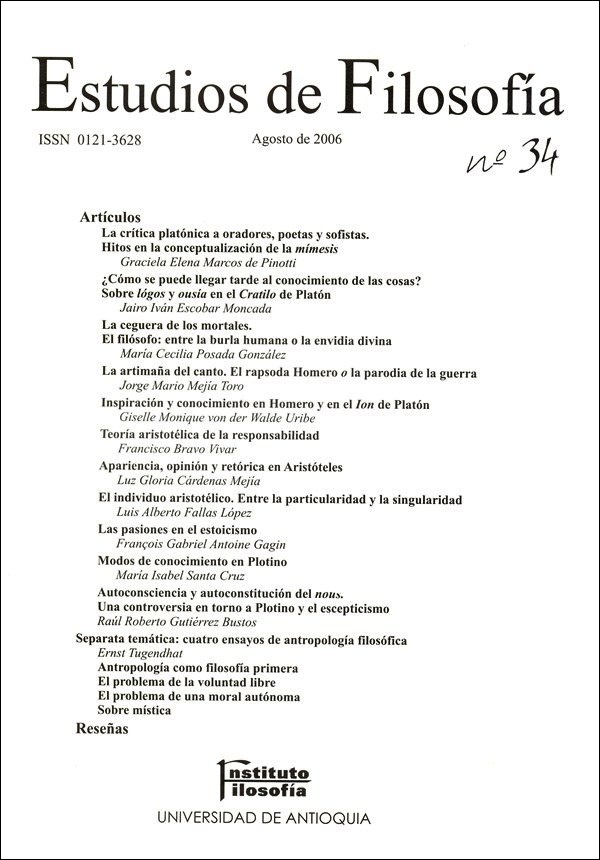Appearance, Opinion, and Rhetoric in Aristotle
DOI:
https://doi.org/10.17533/udea.ef.12781Keywords:
Aristotle, rethoric, opnion, appearance, communityAbstract
Various specialists of the Twentieth Century have recognized the important cognoscitive role that. Aristotle gave to opinion in the construction of knowledge. This paper shows that the diverse posed interpretations are about the discussion on how the retationship between opinion: (doxa) and appearance (phainomena) is understood or how the possible identification of them is grasped. Using these notions as a starting point, a proposal is made to see how Aristotle integrates them in his theory of rhetoric. Through a rhetortcal exercise the member of a determínate community deliberate, judge or recognize what is considered fair, convenient or worthy, when they, examine certain cases that are presented to their consideration. Rhetoric is presented as an art in, which opinion and appearance are combined. Through this art persuasion is brought on and a common experience is constructed (ways of seeing, of acting, or feeling) and in this way the polis is made
Downloads
References
Aristóteles. Acerca del alma. Traducción de Tomás Calvo Martínez. Madrid, Gredos, 1988.
____________. Etica Nicomaquea. Etica Eudemia. Traducción de Julio Pallí Bonet. Madrid, Gredos, 1998.
____________. Metafísica. Traducción de Valetín García Yebra. Madrid, Gredos, 1987.
____________. Politeia. Prólogo, versión directa del original griego y notas por Manuel Briceño Jáuregui, S. J., Bogotá, Instituto Caro y Cuervo, 1989.
____________. Retórica, Traducción de Quintín Racionero. Madrid, Gredos, 1994.
Safarti, E. G. Apres Perelman: Quelles politiques pour les nouvelles rhétorique. Textes réunis et présentés pour Roselyn Koren et Ruth Amossy. Paris, L’Harmattan, 2002.
Le Blond, J. M. Logique el Methode chez Aristote. Paris, Ed. Librairie Philosophique J. Vrin, 1996.
Mansion, S. Le jugement d 'existence chez Aristote. Louvain, Editions de l’Institut Supérieur de Philosophie, 1976.
Nussbaum, M. La fragilidad del bien. Fortuna y ética en la tragedia y la filosofía griega. Madrid, Visor, 1995.
Owens, G. E. L.“ti évai xa cpatvopiva” En: Aristote et le problémes de méthode. Comunications presentées au Symposium Aristotelicum tenu a Lovain. Louvain-Paris, 1960-1961.
Regis O.M., L.G L 'opinion selon Aristote. Paris, Otawa, Librairie Philosophique J. Vrin, Innst d’Etudes Médievales, 1935.
Downloads
Published
How to Cite
Issue
Section
Categories
License
Copyright (c) 2006 Luiz Gloria Cárdenas Mejía

This work is licensed under a Creative Commons Attribution-NonCommercial-ShareAlike 4.0 International License.
Authors who publish with this journal agree to the following terms:
1. The Author retains copyright in the Work, where the term "Work" shall include all digital objects that may result in subsequent electronic publication or distribution.
2. Upon acceptance of the Work, the author shall grant to the Publisher the right of first publication of the Work.
3. The Author shall grant to the Publisher a nonexclusive perpetual right and license to publish, archive, and make accessible the Work in whole or in part in all forms of media now or hereafter known under a Creative Commons Attribution-NoCommercia-ShareAlike (CC BY-NC-SA 4.0), or its equivalent, which, for the avoidance of doubt, allows others to copy, distribute, and transmit the Work under the following conditions: (a) Attribution: Other users must attribute the Work in the manner specified by the author as indicated on the journal Web site;(b) Noncommercial: Other users (including Publisher) may not use this Work for commercial purposes;
4. The Author is able to enter into separate, additional contractual arrangements for the nonexclusive distribution of the journal's published version of the Work (e.g., post it to an institutional repository or publish it in a book), as long as there is provided in the document an acknowledgement of its initial publication in this journal;
5. Authors are permitted, and Estudios de Filosofía promotes, to post online the preprint manuscript of the Work in institutional repositories or on their Websites prior to and during the submission process, as it can lead to productive exchanges, as well as earlier and greater citation of published work (see The Effect of Open Access). Any such posting made before acceptance and publication of the Work is expected be updated upon publication to include a reference to the Estudios de Filosofía's assigned URL to the Article and its final published version in Estudios de Filosofía.















